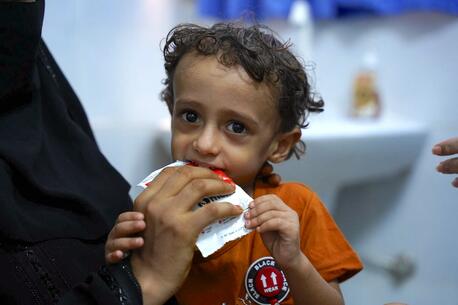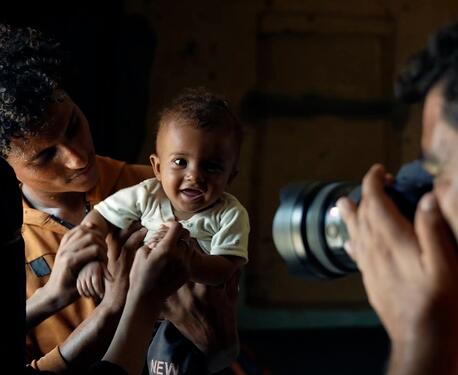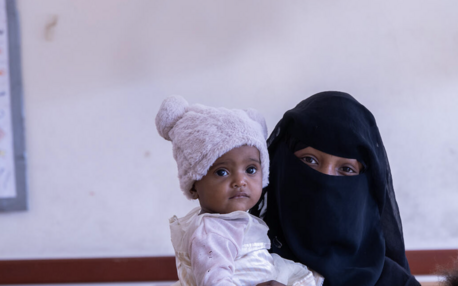
Yemen Crisis
A look at UNICEF's impact for children in Yemen.
Yemen is in the midst of a major humanitarian crisis — one of the world's worst — due to prolonged conflict, a deteriorating economy and weakened social services.
The war in Yemen has had disastrous consequences for the country. Violence continues to kill or main children.
Some 4.5 million are displaced within the country, 2 million of them children. Almost 13 million children urgently need humanitarian assistance. Poor access to safe water and poor sanitation have magnified health risks. Children remain vulnerable to malnutrition, cholera and death from common infections.
In Yemen today, acute malnutrition affects more than 2 million children, including over 540,000 children who have severe acute malnutrition (SAM). SAM can be fatal if left untreated.
How is UNICEF responding to the crisis in Yemen?
UNICEF is actively working to bring relief to children and families in Yemen, focusing on those who are suffering the most. UNICEF's strategy in the country is to provide direct, lifesaving assistance while also supporting long-term development goals, by helping to strengthen health and other systems and building community resilience.
UNICEF programs and interventions in Yemen seek to:
- improve access to safe water for drinking, cooking and personal hygiene and adequate sanitation
- expand learning opportunities to children whose schooling has been disrupted by the war
- identify and treat children with severe acute malnutrition
- immunize children against vaccine-preventable diseases
- help more children and women access primary health care
- provide psychosocial support to children who have experienced trauma and loss
- strengthen gender-based violence prevention and response
Stories from Yemen
Here are a few stories about the people UNICEF has reached through its programming:
Empowering youth with life skills training

Life skills training programs supported by UNICEF and partners reach young people, many of them teenagers who had to drop out of school when their families could no longer afford to send them. The program is designed to be preparation for vocational training, where children can learn relevant job skills to enter the workforce. The program is also an alternative for young girls who are at risk of early marriage and boys who are at risk of being recruited into armed groups.
Mohammed, 14, had to drop out of school in the fifth grade to help support his family. In the life skills program, he’s learned problem-solving and public speaking. “I’ve also learned communication and negotiation skills," he said. "I want to learn solar panel maintenance, and I think these skills will help me succeed."
Lifesaving therapeutic food treats children with severe acute malnutrition

To help address Yemen's malnutrition crisis, UNICEF provides Ready-to-Use Therapeutic Food (RUTF), a nutrient-rich peanut paste and lifesaving treatment for children under age 5 who are suffering from severe acute malnutrition, or wasting disease.
The paste is made from peanuts, powdered milk, vegetable oil and vitamins and minerals. It’s digestible, easy to distribute and each packet has 500 calories. UNICEF procures 80 percent of the RUTF distributed worldwide and has sent 7,500 cartons of this supply to treat 7,500 children under five in Yemen.
UNICEF-supported mobile teams deliver lifesaving nutrition services to children

Millions of the families who are internally displaced in Yemen face harsh living conditions and often go without enough food to feed their children. Because of the war, Waleed Al-Ahdal, 25, and his family were forced to relocate to a camp in Al-Jufainah, the largest camp in the country with 9,000 families. Life conditions became extremely difficult once the family relocated to the camp. "We are facing a difficult reality. I struggle to provide the basics for my family. All I can get is temporary daily work. Because of that, I am burdened with debts, and we find ourselves unable to afford three meals a day," Waleed said.
His youngest daughter Ghosson, 2, was diagnosed with severe acute malnutrition. Fortunately, she was able to regain her health with support from a UNICEF-supported treatment center after being diagnosed by a mobile health care team. Mobile teams visit the camp regularly and deliver essential services, including malnutrition screening and referral to external treatment centers when necessary.
Read more about UNICEF-supported mobile teams here.
Here are a few highlights of UNICEF’s work in 2022:
- Providing treatment for about 300,000 children with severe acute malnutrition, working in over 4,600 health facilities. Scaled treatment and prevention of malnutrition with mobile teams and outpatient programs
- Providing 9 people in 1.4 million households cash transfers to spend as they liked. Recipients primarily used the money for food and medical expenses.
- Providing vaccination against polio to more than 3.4 million children
- Reaching 6.6 million people, almost 3 million of them children, with safe drinking water, sanitation services and WASH supplies
- Supplying 5.5 million mothers and children primary health care services through UNICEF supported facilities
How to help the children in Yemen
The needs of children in Yemen are some of the greatest in the world. Support UNICEF's efforts in delivering critical nutrition, health care, protection and education to vulnerable children and families in Yemen. Donate today.
HOW TO HELP
There are many ways to make a difference
War, famine, poverty, natural disasters — threats to the world's children keep coming. But UNICEF won't stop working to keep children healthy and safe.
UNICEF works in over 190 countries and territories — more places than any other children's organization. UNICEF has the world's largest humanitarian warehouse and, when disaster strikes, can get supplies almost anywhere within 72 hours. Constantly innovating, always advocating for a better world for children, UNICEF works to ensure that every child can grow up healthy, educated, protected and respected.
Would you like to help give all children the opportunity to reach their full potential? There are many ways to get involved.





